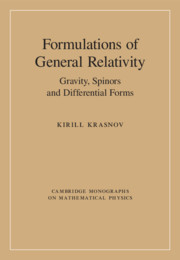
- Publisher:
- Cambridge University Press
- Online publication date:
- November 2020
- Print publication year:
- 2020
- Online ISBN:
- 9781108674652

This monograph describes the different formulations of Einstein's General Theory of Relativity. Unlike traditional treatments, Cartan's geometry of fibre bundles and differential forms is placed at the forefront, and a detailed review of the relevant differential geometry is presented. Particular emphasis is given to general relativity in 4D space-time, in which the concepts of chirality and self-duality begin to play a key role. Associated chiral formulations are catalogued, and shown to lead to many practical simplifications. The book develops the chiral gravitational perturbation theory, in which the spinor formalism plays a central role. The book also presents in detail the twistor description of gravity, as well as its generalisation based on geometry of 3-forms in seven dimensions. Giving valuable insight into the very nature of gravity, this book joins our highly prestigious Cambridge Monographs in Mathematical Physics series. It will interest graduate students and researchers in the fields of theoretical physics and differential geometry.
‘The work is mathematically rigorous and complete. Researchers working in fields such as quantum gravity will find this a very useful reference. Postgraduate students will also find it a helpful adjunct to the usual books on general relativity.’
Source: Choice
'… in this book Krasnov deals mainly with chiral formulations of four-dimensional general relativity, a topic that usually is not present in most (if not all) of the relevant textbooks, thereby bringing to the forefront the importance of Cartan’s calculus of differential forms, the geometry of fibre bundles, but also spinors and (finally) twistors.'
Theophanes Grammenos Source: MathSciNet
 Loading metrics...
Loading metrics...
* Views captured on Cambridge Core between #date#. This data will be updated every 24 hours.
Usage data cannot currently be displayed.
Accessibility compliance for the PDF of this book is currently unknown and may be updated in the future.